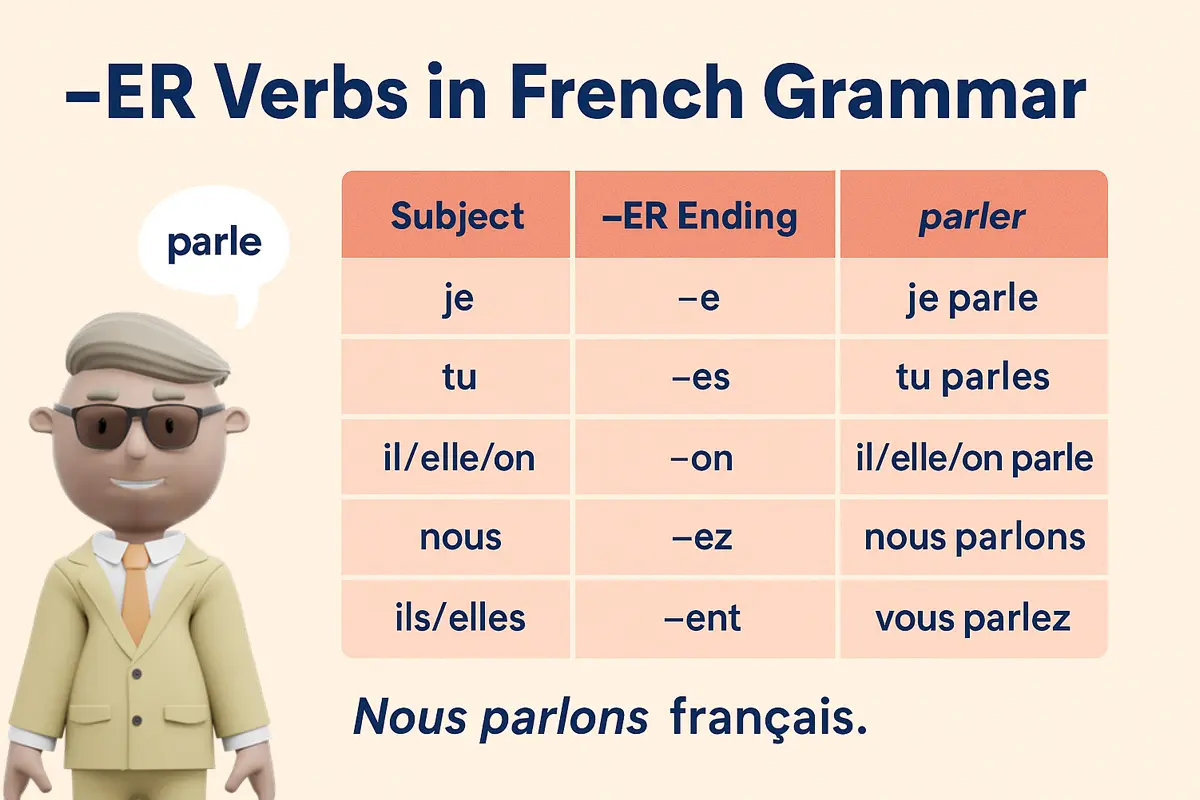
If you’re learning French, mastering regular ER verbs is one of the most important steps to start forming full sentences. These verbs are the most common and consistent in French grammar, especially in the present tense, making them the perfect entry point for beginners.
In this guide, you’ll learn:
- What ER verbs are and how they work in French
- How to conjugate them using the stem or radical
- Tips for remembering endings like -e, -es, -ons, etc.
- Real-world usage and common verb examples
- Mistakes to avoid and when to expand to other forms
🚀 What Are -ER Verbs in French?
French verbs are grouped into three main types based on their infinitive endings:
- -ER verbs (e.g., parler, travailler)
- -IR verbs
- -RE verbs
Among these, -ER verbs are the most common and regular, making them ideal for beginners. Most follow the same conjugation pattern and don’t require irregular transformations.
🧩 How to Conjugate Regular -ER Verbs in the Present Tense
To conjugate an ER verb in the present tense, follow this process:
Step-by-step Conjugation
-
Drop the -er ending from the infinitive form to find the stem or radical
e.g. parler → parl- -
Add the correct present tense endings based on the subject:
| Subject | Ending | Example (parler) |
|---|---|---|
| Je | -e | Je parle |
| Tu | -es | Tu parles |
| Il / Elle | -e | Il parle |
| Nous | -ons | Nous parlons |
| Vous | -ez | Vous parlez |
| Ils / Elles | -ent | Ils parlent |
Note: Some verbs like commencer change to nous commençons (with a cedilla) to maintain soft pronunciation.
🗣️ 10 Common Regular ER Verbs to Know
Start with these high-frequency verbs in French:
- Parler – to speak
- Aimer – to like/love
- Donner – to give
- Regarder – to watch
- Travailler – to work
- Écouter – to listen
- Jouer – to play
- Habiter – to live (in a place)
- Marcher – to walk
- Étudier – to study
All these verbs are regular ER verbs, and conjugate following the same rule.
🧠 Example Sentences Using -ER Verbs
Use these examples to get familiar with subject-verb agreement:
- Je parle français. – I speak French.
- Nous regardons la télé. – We watch TV.
- Ils aiment la musique. – They love music.
- Tu travailles demain ? – Are you working tomorrow?
- Elle habite à Paris. – She lives in Paris.
Pay attention to ils/elles usage and silent endings.
❗ Common Mistakes to Avoid
-
Mispronouncing silent endings
Ils parlent ends with -ent but sounds the same as il parle. -
Using wrong subject endings
Mix-ups like tu parlez instead of tu parles are common. -
Confusing irregular verbs
Don’t assume every -ER verb is regular. Aller is irregular even though it ends in -er.
🧭 Beyond ER Verbs: What’s Next?
Once you’re confident with regular ER verb conjugations, move on to:
- Irregular -ER verbs like aller
- IR and RE verbs with different rules
- More complex tenses beyond the present tense, like passé composé or futur proche
But solid mastery of ER verbs lays the foundation for all other verb conjugations.
📚 Practice Exercise
Try conjugating the verb travailler (to work) in the present tense:
- Je __________
- Tu __________
- Il/Elle __________
- Nous __________
- Vous __________
- Ils/Elles __________
✅ Answers:
Je travaille, Tu travailles, Il/Elle travaille, Nous travaillons, Vous travaillez, Ils/Elles travaillent
💬 Bonus: Spotting New Regular ER Verbs
Here’s how to identify regular -ER verbs:
- Ends in -er (excluding aller)
- Follows the regular conjugation pattern
- Keeps a consistent stem (no spelling changes)
Look for verbs like changer, danser, jouer, or préparer — all of which behave predictably in present tense.
❓Frequently Asked Questions
What makes -ER verbs different from other French verbs?
ER verbs follow predictable patterns. IR and RE verbs often require memorizing irregular forms.
Is “aller” a regular -ER verb?
No. “Aller” is irregular and does not follow the regular -ER verb conjugation rules.
Can I use -ER verbs in other tenses?
Absolutely. In the past, use avoir + past participle: J’ai parlé = I spoke.
What’s the difference between “parler” and “dire”?
“Parler” means to speak; “dire” means to say. Use them in different contexts.
Do all ER verbs follow the same stem rules?
Most do. But watch out for spelling adjustments in the nous form:
commencer → nous commençons
manger → nous mangeons
🎯 Final Thoughts
Regular ER verbs form the backbone of French communication. Learning to drop the -er, apply the correct endings, and memorize common patterns gives you a powerful tool to start speaking fluently.
Keep practicing, focus on consistent usage, and gradually expand to other verb conjugation groups. You’re building a solid foundation for mastering French!